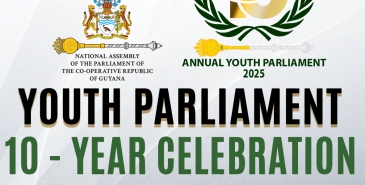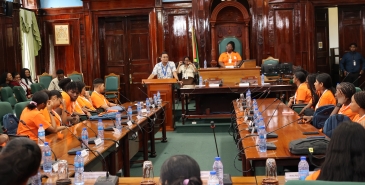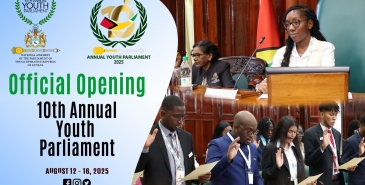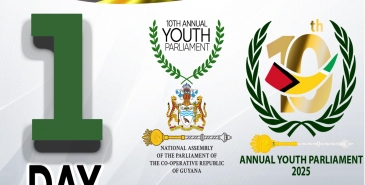Appointment Of A Commission Of Inquiry To Investigate The Incidence Of Trafficking In Persons In Guyana
Speech delivered at: 57thSitting - Tenth Parliament - 22 May, 2013
22 May, 2013
7455
APPOINTMENT OF A COMMISSION OF INQUIRY TO INVESTIGATE THE INCIDENCE OF TRAFFICKING IN PERSONS IN GUYANA
Mr. Nandlall: Mdm. Deputy Speaker, thank you very much. I have listened keenly to the debate on going thus far. I want to make it abundantly clear that this Administration regards trafficking in person as a serious crime, a grave social wrong and condemns trafficking in person in every form, fashion and manifestation. It is as a result of this philosophical and policy position that this Administration has taken a serious of initiatives to prioritise its treatment of this matter.
We have passed for the first time in this country, legislation to outlaw trafficking in person. We have set up a taskforce to specifically deal with this matter. We have assigned responsibility to two ministries to address this serious problem. In our Constitution we have a menu of fundamental rights and freedoms, the accumulative effect of which are to protect persons against state authorities in respect of exploitation in every form and fashion, including of course trafficking of person. So, this Administration’s position on this matter is beyond any dispute. Our position is very clear, trafficking in person is wrong and we condemn it in every form or fashion. But what I take issue with is this motion singles out this singular wrong in our society and accords it the treatment that it does. I am careful to emphasise that what I am going to say is not intended to in anyway minimise the importance of this social problem of this criminal offence. I do not intend to convey the impression that this Administration is trivialising this matter in any form or fashion. We have several problems of this kind in our country. We have for example, a serious drug problem in our country; we have a serious suicide problem in our country; we have an interpersonal violence issue in this country that inspired, motivated and precipitated your Honour to move successfully a motion in this Assembly, which received the unanimous of this House; we have a road traffic problem in this country, over 100 persons, per year, die on our roads. These are problems that are of equal importance or as important as the issue which forms the subject of this motion.
Why has this motion therefore single out this one issue for this special treatment? Therein lies some form of …[Interruption]. This is what causes me to question the bona fides of the motion. We know that trafficking in person is an issue that is attracting international attention; we know that there are certain governments in the North who normally expresses views on this matter. Is it that this motion is intended to court these governments? If it is that we are concerned about social problems in our country; if it is that we are concerned about crime in our country, then we cannot isolate one and address it in this way.
The other issue that I have with this motion is the fact that it requires the establishment of a Commission of Inquiry. Recently, we had a Commission of Inquiry and most persons would have had an opportunity to view how a Commission of Inquiry under the Commission of Inquiry Act, the very Act upon which this motion is predicated, how that institution works. Having listened to many of the speakers here and the issues which they have raised and the recommendations which they have made, the forum or the mechanism of a Commission of Inquiry is highly unsuitable to deal with the issues raised. I do not for one moment, as I said, say that this is not an issue that should be addressed and accorded all the attention that the Government can possibly give on a singular social wrong or a singular crime in our country. That is not my issue. My issue is that I do not believe that trafficking in person is a problem that is of the type and nature that requires the establishment of a Presidential Commission of Inquiry to conduct an inquiry into this and that is my fundamental objection to this issue.
It also brings me to another matter and it has to do with the Commission of Inquiry itself as a legal mechanism. The Commission of Inquiry, as the motion accurately describes it, has its genesis and is a creation of or a creature of the Commission or Inquiry Act. The Commission of Inquiry Act and it is quoted in the motion itself which says:
“The President may issue a commission appointing one or more commissioners and authorising such commissioner or commissioners to inquire into any matter in which an inquiry would, in the opinion of the President be for public welfare.”
So you see very clearly that this is a Presidential power and the activation of this power lies within the prerogative of the President. It is a personal matter. That is why in the Linden Commission of Inquiry, if we can recall, it is the President who announced the intention to activate this Act for the purpose of the establishment of a Commission of Inquiry… [Interruption]. Yes, he did it on his own volition. I am not in doubt about that. I can give the time, date and place when the President made the announcement. It was one that was not solicited or influenced by any other source or institution.
I am not speaking from the top of my head. Our Constitution is what is called a Presidential Constitution. It creates an executive presidency and it resides in that executive presidency all executive authority in this land. That is what the Constitution says. Then Article 111 of this Constitution specifically addresses Presidential power. We have to be weary of these things because the President, whether you want to accept it or not, it is a Constitutional reality, is not a normal office holder. This is a Presidential Constitution creating an executive presidency and this Constitution outlines how that executive power is to be exercised. It says this:
“In the exercise of his function under this Constitution…”
I am reading from Article 111 (1).
“… or under any other law…”
Which of course, will include the Commission of Inquiry where the President here has the power.
“In the exercise of his functions under this Constitution or any other law the President shall act in accordance with his own deliberate judgement, except, in cases where by this Constitution or by any other law he is required to act in accordance with the advice or recommendation of any other person or authority.”
The singular purpose or objection of this provision is to ensure that that residue of power, which resides in the President and for which he is not required to consult anyone that power must remain a power to be exercised by him in his own deliberate judgement. I am not saying so, the Constitution is saying so. [Interruption]. Mdm. Deputy Speaker, do you see, they have started. I am making my presentation and I am reading from the Constitution.
Mdm. Deputy Speaker: Hon. Attorney General, once you angle yourself towards me, you would be under my protection. Do not be swayed.
Mr. Nandlall: Article 111 is divided into two parts. The second part of it deals with where the President has an obligation to consult and it explains in great details how that power is to be exercised when he has an obligation to consult or when he is to act upon the advice of or upon the recommendation of any other body or agency, for example it says, when he is required to do so then he or the authority must advise him and if he disagrees with the advice, he must send it back to that authority and that authority is free to send it back a second time to the President. When that advice comes a second time to the President, then the President loses his power after that. He must accept the advice.
Dr. Roopnarine is very much aware of this provision because this was put in to dilute the powers of the President in the Constitutional Reform Commission. But, the Constitutional Reform Commission in its wisdom retained a part of the Presidential power that allows him and only him, uninfluenced by the advice, recommendation or resolution of any other institution to exercise a particular type of power. Unless that power comes under category two in Article 111, then no institution can in any form or fashion seek to influence the President in the establishment of a Commission of Inquiry. He must do so on his own deliberate judgement.
How would the President justify setting up a Commission of Inquiry to investigate trafficking in person, but do not establish a Commission of Inquiry to investigate suicide, road traffic accident, murder, interpersonal violence? The point I am making is the Presidential power to establish a Commission of Inquiry must never be trivialised and must never be used in a selected way. It has to be a situation that demands the use of such exorbitant and extraordinary power. That is my principle object to this motion. Thank you very much. [Applause]
Speech delivered by:
What's New

17 August, 2025
10th Annual Youth Parliament Closes: Celebrating a Decade of Impact, Excellence, and Youth Empowerment10th Annual Youth Parliament Closes: Celebrating a Decade of Impact, Excellence, and Youth Empower

13 August, 2025
Youth Parliamentarians Assemble for Grand Rehearsals for the 10th Annual Youth Parliament

12 August, 2025
10th Annual Youth Parliament Kicks Off – Young Voices, Bold Ideas, Bright Futures!

11 August, 2025
10th Annual Parliament Kicks off tomorrow

